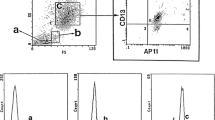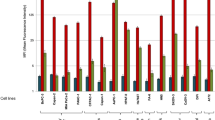Abstract
In a previous study, we used a murine monoclonal antibody, A7, against human colon carcinoma as a drug-carrier to treat colorectal cancer.1 In the present study, we found that MAb A7 also reacted immunohistochemically with 73% of human pancreatic carcinoma cell lines, with the A7 antigen mainly being detected on the cell surface. However, the A7 antigen was found in only 9% of the spent media of these human pancreatic carcinoma cell lines by ELISA. On the other hand, the positive incidence of CA19-9, POA, ferritin, CEA, DU-PAN-2 and SLX in those spent media was 100%, 64%, 64%, 55%, 55% and 36%, respectively. These results suggest that the A7 antigen may only rarely be shed into the sera of pancreatic cancer patients, in which case MAb A7 could be a suitable drug-carrier in targeting chemotherapy for pancreatic cancer patients.
Similar content being viewed by others
References
Takahashi T, Yamaguchi T, Kitamura K, Suzuyama H, Honda M, Hashimoto Y (1988) Clinical application of monoclonal antibody-drug conjugates for immunotargeting chemotherapy of colorectal carcinoma. Cancer 61:881–888
Gold P, Freedman SO (1965) Demonstration of tumor specific antigens in human colon carcinoma by immunological tolerance and absorption technique. J Exp Med 121:439–462
Magnani JL, Steplewski Z, Koprowski H, Ginsburg V (1983) Identification of the gastrointestinal and pancreatic cancer-associated antigen detected by MAb 19-9 in the sera of patients as a mucin. Cancer Res 43:5489–5492
Gelder FB, Reese CJ, Moossa AR, Hall T, Hunter R (1978) Purification, partial characterization, and clinical evaluation of a pancreatic oncofetal antigen. Cancer Res 38:313–324
Browitz MJ, Tuck FL, Sindelar WF, Fernsten PD, Metzgar RS (1984) Monoclonal antibodies against human pancreatic adenocarcinoma: Distribution of DU-PAN-2 antigen on glandular epithelia and adenocarcinoma. J Natl Cancer Inst 72:999–1003
Fukushi Y, Kannagi R, Hakomori S (1985) Location and distribution of difocoganglioside in normal and tumor tissues defined by its monoclonal antibody FH-6. Cancer Res 45:3711–3717
Metzgar RS, Gaillard MT, Levine SJ, Tuck FL, Bossen EH, Borowitz MJ (1982) Antigen of human pancreatic adenocarcinoma cells defined by murine monoclonal antibodies. Cancer Res 42:601–606
Klavince JV (1981) Tumor markers of pancreatic carcinoma. Cancer 47:1957–1601
Fukuda K (1985) The study of targeting chemotherapy against the gastrointestinal cancer (the preparation of anticancer drug — monoclonal antibody conjugate and the investigation about its biological activity). Akita J Med 12:451–468
Yamaguchi N, Kawai K (1986) Acid protease from human pancreatic carcinoma cell line HPC-YT into serum-free, chemically defined medium. Cancer Res 46:5353–5359
Siroeda O, Yamaguchi N, Kawai K (1987) Stimulation of low density lipoprotein receptor activity by conditioned medium from human cancer cell line. Cancer Res 47:4630–4633
Kotanagi H, Takahashi T, Masuko Y, Hashimoto Y, Koyama K (1986) A monoclonal antibody against human colon cancers. Tohoku J Exp Med 148:353–360
Su-Ming Hsu, Raine L, Fanger H (1981) Use of avidin-biotin-peroxidase complex (ABC) in immunoperoxidase technique. J Histochem Cytochem 29:577–580
Laemmli UK (1970) Cleavage of structural proteins during the assembly of the head of bacteriophage T4. Nature 227:680–685
Towbin H, Staehelin T, Gordon J (1979) Electrophoretic transfer of proteins from polyacrylamide gels to nitrocellulose sheets. Proc Natl Acad Sci 76:4350–4353
Marianne J, Clausen PP, Susanne S (1980) The effect of fixation and tripsinization on the immunohistochemical demonstration of intracellular immunogroblin in paraffin embedded material. Acta Path Microbiol Scand Sect 88:369–376
Allum WIF, Stokes HJ, Macdonald F, Fielding JWL (1986) Demonstration of carcinoembryonic antigen (CEA) expression in normal, chronically inflamed, and malignant pancreatic tissue by immunochemistry. J Clin Pathon 39:610–614
Inufusa H (1988) Development of spontaneous lung metastasis (in Japanese). Nippon Geka Gakkai Zasshi (J Jpn Surg Soc) 89:1075–1082
Chin JK, Rong GH, Scharff JE, Sindelar WF (1986) Gastro-intestinal carcinoma-associated antigen defined by a murine monoclonal antibody. J Natl Cancer Inst 77:599–603
Zenon S, Toong H, Herlyn M, Koprowski M (1981) Release of monoclonal antibody-defined antigens by human colorectal carcinoma and melanoma cells. Cancer Res 41:2723–27
Ban T, Imai K, Takai Y, Ibayashi Y, Hirai K, Sugiyama T, Endo T, Yachi A (1988) Comparison between two new tumor markers “Sialyl SSEA-1 antigen” and “YH 206 antigen” in sera of pancreatic cancer patient. Suizou 3:507–512
Kitamura K, Takahashi T, Yamaguchi T, Yokota T, Noguchi A, Amagai T, Imanishi J (1989) Immunochemical characterization of the antigen recognized by the murine monoclonal antibody A7 against human colorectal cancer. Tohoku J Exp Med 157:83–93
Author information
Authors and Affiliations
Rights and permissions
About this article
Cite this article
Otsuji, E., Yamaguchi, T., Yamaguchi, N. et al. Expression of the cell surface antigen detected by the monoclonal antibody A7 in pancreatic carcinoma cell lines. Surg Today 22, 351–356 (1992). https://doi.org/10.1007/BF00308745
Received:
Accepted:
Issue Date:
DOI: https://doi.org/10.1007/BF00308745




